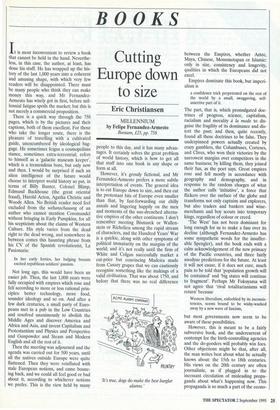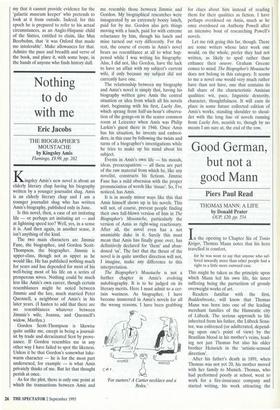BOOKS
Cutting Europe down to size
Eric Christiansen
MILLENNIUM by Felipe Fernandez-Armesto Bantam, £25, pp. 758 It is most inconvenient to review a book that cannot be held in the hand. Neverthe- less, in this case, the author, at least, has done his stuff. He has wrapped up the his- tory of the last 1,000 years into a coherent and amusing shape, with which very few readers will be disappointed. There must be many people who think they can make money this way, and Mr Fernandez- Armesto has wisely got in first, before mil- lennial fatigue spoils the market; but this is not merely a commercial proposition.
There is a quick way through the 758 pages, which is by the pictures and their captions, both of them excellent. For those who take the longer route, there is the pleasure of travelling with a cultivated guide, unencumbered by ideological bag- gage. He sometimes feigns a cosmopolitan stance, sometimes extra-terrestrial; refers to himself as a 'galactic museum keeper', which is a tremendous bore, but only now and then. I would be surprised if such an alien intelligence of the future would choose to interpret world history so pat, in terms of Billy Bunter, Colonel Blimp, Edmund Backhouse (the great oriental fraud), Harold Acton, Agatha Christie and Woody Allen. No British reader need feel excluded from the weltanschauung of an author who cannot mention Coromandel without bringing in Early Pumpkins, for all his scepticism about the claims of Western Culture. His style varies from the dead right to the dead wrong, and somewhere in between comes this haunting phrase from his CV of the Spanish revolutionist, La Pasionaria:
In her early forties, her bulging breasts excited republican soldiers' passion.
Not long ago, this would have been an easier job. Then, the last 1,000 years were fully occupied with empires which rose and fell according to more or less rational prin- ciples: better technology, more food, sounder ideology and so on. And after a few dark centuries, a small party of Euro- peans met in a pub in the Low Countries and resolved unanimously to abolish the Middle Ages and discover America and Africa and Asia, and invent Capitalism and Protestantism and Physics and Perspective and Gunpowder and Steam and Modern English and all the rest of it.
Then the meeting was adjourned and the agenda was carried out for 500 years, until all the natives outside Europe were quite flattened. Then they were reinflated with stale European notions, and came bounc- ing back, and we could all feel good or bad about it, according to whichever notions we prefer. This is the view held by many people to this day, and it has many advan- tages. It certainly solves the great problem of world history, which is how to get all that stuff into one book in any shape or form at all.
However, it's grossly fictional, and Mr Fernandez-Armesto prefers a more subtle interpretation of events. The general idea is to cut Europe down to size, and then cut the protestant bits of Europe even smaller than that, by fast-forwarding our chilly annals and lingering happily on the men and moments of the sun-drenched alterna- tive empires of the other continents. I don't remember meeting Bismarck or Wallen- stein or Richelieu among the rapid stream of characters, and the Hundred Years' War is a quickie, along with other symptoms of political immaturity on the margins of the world; and it's not really until the firm of White and Colgan successfully market a cut-price but convincing Madeira made from Canary grapes that we can cautiously recognise something like the makings of a valid civilisation. That was about 1750, and before that there was no real difference 'It's true, dogs do make the best burglar alarms.' between the Empires, whether Aztec, Maya, Chinese, Monomotapan or Islamic: only in size, consistency and longevity, qualities in which the Europeans did not excel.
Empires dominate this book, but imperi- alism is
a confidence trick perpetrated on the rest of the world by a small, swaggering, self- assertive part of it.
The part, that is, which promulgated doc- trines of progress, science, capitalism, racialism and morality d la mode to dis- guise the fragility of its dominance and dis- tort the past; and then, quite recently, found all these doctrines to be false. They underpinned powers actually created by crazy gamblers, the Columbuses, Corteses, and Clives, who won their victories by the narrowest margins over competitors in the same business; by killing them, they joined their fun, as the poet says. Great empires rose and fell mostly in accordance with geography and demography, and in response to the random charges of what the author calls 'initiative', a force that flickers over the surface of the globe and transforms not only captains and explorers, but also traders and bankers and wine- merchants and boy scouts into temporary kings, regardless of colour or creed.
'The West' has not been dominant for long enough for us to make a fuss over its decline (although Fernandez-Armesto has some sympathetic words for the insuffer- able Spengler), and the book ends with a calm acknowledgement of the new primacy of the Pacific countries, and three fairly anodyne predictions for the future. At least it will not cause, if it does not cure, much pain to be told that 'population growth will be contained' and 'big states will continue to fragment'. Perhaps Mr Fukuyama will not agree that 'rival totalitarianisms will return' because
Western liberalism, enfeebled by its inconsis- tencies, seems bound to be wishy-washed away by a new wave of fascism,
but most governments now seem to be aware of these possibilities.
However, this is meant to be a fairly subversive book, and the undercurrent of contempt for the birth-controlling agencies and the do-gooders will probably win foes. Other objections might be that, after all, the man writes best about what he actually knows about: the 15th to 18th centuries. His views on the 20th century are often journalistic, as if plugged in to the incessant circulation of misleading propa- ganda about what's happening now. This propaganda is so much a part of the econo- my that it cannot provide evidence for the 'galactic museum keeper' who pretends to look at it from outside. Indeed, for this epoch he is prepared to refer to his actual circumstances, as an Anglo-Hispanic child of the Sixties, entitled to claim, like Max Beerbohm, that 'it was Oxford that made me intolerable'. Make allowances for that. Admire the pace and breadth and verve of the book, and place it, with some hope, in the hands of anyone who finds history dull.



















































 Previous page
Previous page